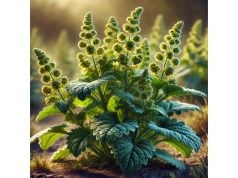
Dayflower is the common name for several plants in the Commelina genus, a group of delicate blue-flowering herbs used in traditional medicine across Asia, Africa, and the Americas. Although the flowers look gentle, the plants themselves are chemically active and surprisingly diverse. Different Commelina species have been used for skin irritation, inflammation, fever, digestive discomfort, and wound support, and some are also eaten as wild greens. Modern research now supports part of that traditional picture, especially for antioxidant, anti-inflammatory, and antimicrobial effects in laboratory and animal studies. Still, “dayflower” is not one single herb with one fixed profile, and that is where many articles become misleading. Species, plant part, and preparation all matter. This guide gives you a practical, evidence-aware overview of dayflower’s key compounds, realistic health benefits, common uses, dosage limits, and safety concerns without overstating what the science can prove.
Key Takeaways
- Dayflower species contain flavonoids, phenolics, and related compounds that may support antioxidant and anti-inflammatory activity in early research.
- Some Commelina species are used as edible greens, but food use does not mean concentrated extracts are safe for self-treatment.
- There is no standardized human medicinal dose; preclinical studies often test extracts at about 100 to 400 mg/kg in animals or up to 1.5 mg/mL in cell models.
- Avoid medicinal dayflower use during pregnancy and breastfeeding, especially stem-based preparations.
- Use only correctly identified species, because chemistry and safety can differ across Commelina plants.
Table of Contents
- What Is Dayflower and What Is It Used For
- Key Ingredients in Dayflower
- Does Dayflower Help With Health Issues
- How to Use Dayflower in Practice
- How Much Dayflower Per Day
- Dayflower Side Effects and Who Should Avoid It
- What the Evidence Actually Says
What Is Dayflower and What Is It Used For
“Dayflower” usually refers to species in the Commelina genus, which includes a large number of plants found in tropical and subtropical climates, with some species also growing in temperate regions. The flowers are often blue and short-lived, opening for only part of the day, which explains the common name. In herbal medicine, though, the flower is only part of the story. The medicinal value is usually associated with the leaves, stems, or whole aerial parts, depending on the species and local tradition.
One of the most important things to know is that dayflower is a genus-level name, not a single standardized herb. A remedy made from Commelina communis is not automatically equivalent to one made from Commelina benghalensis or Commelina erecta. That species difference affects chemistry, likely benefits, and even safety.
Traditional uses vary by region, but common themes include support for:
- inflammation and swelling
- skin irritation and minor wound care
- fever and heat-related discomfort
- digestive complaints
- urinary symptoms
- general wellness tonics
In some communities, certain dayflower species are also eaten as wild greens. That dual role as both food and medicine is one reason the genus remains important in ethnobotany. It is accessible, locally available, and familiar. But this familiarity can create a false sense of safety, especially when people move from food use to concentrated extracts.
A practical way to classify dayflower use is:
- Culinary use in edible species and food-level portions
- Traditional herbal use as tea, decoction, or topical application
- Research-style extract use with concentrated preparations tested in labs or animals
These are not interchangeable. A cooked wild green is not the same as a hydroalcoholic extract. A mild tea is not the same as a solvent fraction tested in a pharmacology study.
Another reason dayflower interests researchers is its broad traditional footprint. When a plant genus is used repeatedly across cultures for similar problems, such as inflammation or skin conditions, it often points to real bioactivity worth studying. That does not prove clinical effectiveness, but it helps explain why Commelina has attracted growing attention in phytochemistry and pharmacology.
If you are considering dayflower for health reasons, the best starting point is not dosage. It is identification. You need to know which species, which part of the plant, and which preparation you are dealing with. Once those pieces are clear, the rest of the decisions become much safer and more useful.
Key Ingredients in Dayflower
Dayflower’s medicinal potential comes from its phytochemicals, not from one single “active ingredient.” Across Commelina species, researchers have identified a broad mix of secondary metabolites, especially compounds linked to antioxidant and anti-inflammatory behavior. This is one reason the genus is so interesting: it appears to combine nutritional value in some species with pharmacologically relevant plant chemicals.
The most commonly reported groups of compounds in Commelina species include:
- flavonoids
- phenolic compounds
- tannins
- saponins
- glycosides
- alkaloids
- sterols
- anthocyanins
These groups matter because they often work together. In many herbs, the biological effect does not come from one isolated molecule but from a pattern of compounds that overlap in function. With dayflower, this likely helps explain why traditional uses cover several symptom types.
Flavonoids and phenolics are especially important. In Commelina communis research, flavonoids and polyphenols are often discussed as likely contributors to anti-inflammatory activity. In Commelina erecta, investigators reported a rich phenolic profile with apigenin, luteolin, and quercetin derivatives among the most abundant compounds. These are well-known plant molecules that appear in many medicinal and edible plants and are commonly associated with antioxidant and signaling effects.
Some studies also highlight nutritional and food chemistry features in edible dayflower species. For example, work on Commelina erecta described sugars, organic acids, and tocopherol isoforms, including oxalic acid as a prominent organic acid in aerial parts. That is a useful reminder that an edible dayflower species may function as both a food and a source of bioactive compounds.
There are three practical chemistry lessons that readers should keep in mind:
1. Species chemistry is not uniform
The chemical profile of C. communis does not represent all dayflowers. This is the most common source of confusion in online summaries.
2. Plant parts matter
Leaves, stems, and aerial parts can differ in composition. This matters for both benefits and safety, especially when animal toxicity signals are tied to specific plant parts.
3. Extraction method changes what you get
A water tea, hydroalcoholic extract, and solvent fraction may have very different compound ratios. That means two “dayflower products” can behave very differently even if they come from the same species.
A useful mindset is to treat dayflower as a family of related herbal chemistries rather than one uniform supplement. The real advantage of that diversity is therapeutic potential. The tradeoff is variability. If you want predictable results, species identity and preparation method are just as important as the herb name itself.
Does Dayflower Help With Health Issues
Dayflower shows promising health-related activity in preclinical research, but the evidence is not strong enough yet to support broad medical claims in humans. The most credible benefits today are anti-inflammatory, antioxidant, and antimicrobial effects seen in laboratory and animal models, plus longstanding traditional use for skin and inflammatory complaints.
Anti-inflammatory support
This is one of the better-supported areas in the current literature. In cell-based research using Commelina communis extract, investigators reported reduced inflammatory signaling, including lower nitric oxide production and lower levels of pro-inflammatory cytokines. The study also linked these effects to NF-kB pathway modulation, which is a major pathway involved in immune activation and chronic inflammation.
This kind of result is meaningful because it shows a plausible mechanism, not just a vague “herbal effect.” It suggests dayflower compounds may influence the biological processes that drive inflammation. However, it is still cell research, not a human clinical trial.
Antioxidant activity
Several Commelina species have shown antioxidant activity in preclinical testing. This is consistent with their phenolic and flavonoid content. Antioxidant results alone do not prove therapeutic benefit, but they do support the idea that dayflower may help reduce oxidative stress under certain conditions. In practice, this can matter because oxidative stress and inflammation often occur together.
Antimicrobial potential
Some dayflower extracts have shown antimicrobial effects in lab settings, including activity against bacterial strains. These results help explain traditional use on skin issues and minor wounds. Still, it is important not to overreach. A plant extract inhibiting microbes in a controlled test does not mean it can safely treat a human infection at home.
Metabolic and other emerging uses
Genus-level reviews also describe preclinical signals for antidiabetic, wound-healing, antimalarial, and related pharmacological activities in selected species. These are interesting directions, but they are species-specific and not yet standardized enough for general recommendations.
What is realistic for most people
Dayflower may be useful as:
- a traditional support herb in communities with species knowledge
- a food plant in edible species
- a topical or tea-based adjunct for mild, non-emergency complaints
- a research-interest herb with real pharmacology potential
Dayflower is not well supported yet as a stand-alone treatment for chronic disease, serious infection, diabetes, or inflammatory disorders. The strongest evidence still sits below the human clinical level. That does not make dayflower unhelpful. It just means the best approach is careful, limited, and goal-specific rather than disease-focused self-treatment.
How to Use Dayflower in Practice
Dayflower can be used in several ways, but safe use depends on choosing the right form for the right goal. The biggest mistake people make is treating all dayflower preparations as equivalent. They are not. A cooked edible species, a mild decoction, and a concentrated extract expose you to very different compound levels.
1. Food use in edible species
Some Commelina species are eaten as wild greens in local food traditions. In these cases, the plant is usually prepared like a vegetable rather than a medicine. This is often the gentlest and most practical way to use dayflower when the species is known to be edible.
Good practice for culinary use:
- confirm the species identity before harvesting
- avoid roadside or pesticide-treated areas
- wash thoroughly
- start with a small amount if it is new to you
- avoid daily heavy intake until tolerance is clear
Food use is not a shortcut to medicinal dosing, but it can be a meaningful way to include traditional plants in a balanced diet.
2. Herbal tea or decoction
Traditional medicine often uses leaves or aerial parts as a water preparation. This is a common approach because water extraction is simple, low-cost, and usually milder than alcohol extraction. It may be used for general wellness, digestive comfort, or inflammatory support.
Practical tips:
- Use one clearly identified species.
- Keep the preparation mild at first.
- Try short-term use only.
- Stop if nausea, rash, or cramping appears.
If you are unsure of the plant part, do not improvise. Stem-based and leaf-based preparations may differ in both activity and risk.
3. Topical use
Some traditions use crushed leaves or cooled decoctions on the skin for minor irritation. This can be reasonable for small, superficial issues, but it should not replace proper care for deep wounds, infected skin, or burns.
Topical precautions:
- patch test first
- do not apply to broken deep tissue
- avoid eyes and mucous membranes
- stop if burning or a rash develops
4. Concentrated extracts and supplements
This is the area that requires the most caution. Research studies often use hydroalcoholic extracts or solvent fractions, which can be much stronger than food or tea preparations. These are not automatically suitable for self-use, especially when labels do not specify species, plant part, or extraction method.
A safe decision flow is simple:
- Identify the species
- Choose the goal
- Use the mildest form first
- Track your response
- Stop if side effects appear
That approach is slower than internet “dosage hacks,” but it is far more reliable. With dayflower, preparation is part of the medicine. Using the wrong form can erase the benefit and increase the risk.
How Much Dayflower Per Day
There is no standardized human medicinal dose for dayflower (Commelina spp.). This is the most important dosage point, and it should shape how you interpret everything else. If you see a precise dose online that applies to “dayflower” as a whole, it is usually an oversimplification or a guess.
Why dosage is unclear:
- different Commelina species are used in studies
- researchers test different plant parts
- extracts vary by solvent and strength
- most evidence comes from cell or animal models
- human clinical trials are limited
What research dosing looks like
Preclinical dosing can still be useful for context, but it should never be copied directly for self-treatment.
Examples you may see:
- Commelina communis cell studies tested extract concentrations up to 1.5 mg/mL without reducing cell viability in that model.
- Commelina latifolia animal studies reported efficacy signals at higher oral doses, including 400 mg/kg in mice.
- The same antimalarial study also reported acute oral safety testing at 2000 mg/kg in mice.
These are research conditions, not human dosing instructions. They help scientists explore mechanisms and dose-response patterns, but they do not tell a person how much tea, tincture, or powder to take.
Practical dosage guidance for real-world use
Because clinical dosing standards do not exist, the safest approach is form-based dosing, not “herb-based dosing.”
For food use
- Use normal culinary portions only.
- Treat dayflower as an occasional green unless you have strong local knowledge of the species.
For tea or decoction use
- Start with a mild preparation once daily.
- Avoid long-term use without professional guidance.
- Increase slowly only if tolerated and clearly helpful.
For extracts or capsules
- Use only labeled products with species identification.
- Follow the manufacturer’s instructions exactly.
- Do not combine multiple dayflower products at the same time.
Timing and duration
There is no established best time of day. Most people who use herbal teas tolerate them better with food. For any non-food use, keep the first trial period short:
- Start low.
- Use for 3 to 7 days.
- Watch for digestion, skin, or energy changes.
- Stop if side effects occur.
If your goal is to manage diabetes, chronic pain, inflammatory disease, or recurring infection, dayflower should not be used as a stand-alone plan. The evidence is not mature enough for unsupervised long-term dosing, and species differences add another layer of uncertainty.
The most accurate dosage statement for dayflower today is simple: there is no universal human dose, so use species-specific, product-specific, and cautious dosing practices only.
Dayflower Side Effects and Who Should Avoid It
Dayflower safety depends heavily on species, plant part, preparation strength, and user health status. Some Commelina species are traditionally eaten, which suggests reasonable safety in food amounts. But medicinal use is different, especially with concentrated extracts or stem-based preparations. A food plant can still pose problems when used in high doses or in the wrong context.
Possible side effects
Human adverse-event data are limited, so most safety advice is based on traditional use, phytochemistry, and animal studies. Possible side effects may include:
- stomach upset
- nausea
- loose stools
- skin irritation or rash (topical use)
- allergic reactions in sensitive individuals
These reactions are more likely when someone uses a strong extract, mixes several herbs, or uses an unidentified wild plant.
Pregnancy and breastfeeding warning
This is the clearest safety caution in current dayflower research. A study on Commelina benghalensis stem extract in pregnant rats reported abortifacient potential and liver toxicity signals in that animal model. That finding does not prove the same effect in humans, but it is a serious enough signal to support a strong precaution.
Who should avoid medicinal dayflower use:
- pregnant people
- people trying to conceive
- breastfeeding people
- anyone using stem-based dayflower preparations without expert supervision
Who else should be cautious
Medicinal dayflower use is also a poor choice for:
- children
- people with liver disease
- people with severe plant allergies
- people taking multiple prescription medicines
- anyone unable to verify the exact species
Interaction concerns
Direct interaction data are weak, but caution is reasonable. Some Commelina species show anti-inflammatory or glucose-related activity in preclinical studies, which raises the possibility of additive effects with medications for:
- blood sugar control
- inflammation or pain
- liver-metabolized drugs
This does not mean interactions are proven. It means the evidence is incomplete, so a cautious approach is more responsible than assuming there are none.
Safety habits that reduce risk
- Use a correctly identified species.
- Avoid concentrated extracts unless needed.
- Do not use during pregnancy or breastfeeding.
- Patch test before topical use.
- Stop immediately if symptoms worsen.
If you develop severe abdominal pain, vomiting, fainting, trouble breathing, or unusual bleeding, seek urgent medical care. Herbal safety is not only about toxicity. It is also about not delaying treatment for conditions that need medical diagnosis.
What the Evidence Actually Says
The evidence for dayflower is best described as promising, species-specific, and still early. That may sound cautious, but it is actually the most helpful summary. Dayflower is not an empty folk remedy, and it is not a clinically proven cure. It sits in the middle: a traditional plant group with real pharmacological signals and a clear need for better human research.
What the evidence supports well
1. Strong ethnobotanical relevance
Multiple Commelina species have long-standing traditional use for inflammation, skin problems, fever, and other common complaints. This broad cultural use pattern makes the genus a serious candidate for modern study.
2. Rich phytochemistry
The genus contains flavonoids, phenolics, tannins, glycosides, sterols, and other compounds with likely biological roles. Several studies link this chemistry to antioxidant and anti-inflammatory behavior.
3. Preclinical pharmacology
Cell and animal studies support anti-inflammatory, antimicrobial, antimalarial, and other activities in selected species. These findings are not clinical proof, but they are more meaningful than anecdote alone because they show measurable effects and possible mechanisms.
4. Food and medicine overlap in some species
At least some dayflower species serve as both edible plants and medicinal resources. This dual role adds practical value, especially in communities that rely on local plant foods.
What the evidence does not support yet
- a standardized human medicinal dose
- interchangeable use of all Commelina species
- long-term safety for concentrated extracts
- disease-treatment claims for arthritis, diabetes, infection, or cancer
- pregnancy use
A better way to read dayflower claims online
When evaluating a claim, ask:
- Is the evidence from a human trial, an animal study, or a cell model
- Which Commelina species was studied
- Which plant part and extract type was used
- Was safety discussed clearly
If those details are missing, the claim is probably too broad.
Practical conclusion
Dayflower deserves attention because it combines traditional use, chemical diversity, and encouraging early pharmacology. Its main advantages are accessibility, multi-compound chemistry, and potential for inflammation-related support. Its main limitations are the lack of clinical trials and the risk of treating the whole genus as one herb.
The most responsible way to use dayflower today is with precision and restraint: identify the species, choose the mildest appropriate form, and use it for supportive rather than disease-replacing purposes. That approach respects both the tradition and the current limits of the science.
References
- The genus Commelina: Focus on distribution, morphology, traditional medicinal uses, phytochemistry, and Ethno-pharmacological activities: An updated literature review – PubMed 2024 (Review)
- Treatment with Commelina communis Extract Exerts Anti-inflammatory Effects in Murine Macrophages via Modulation of the Nuclear Factor- κ B Pathway – PubMed 2022 (Preclinical Study)
- Chemical Composition and Biological Activity of Commelina erecta: An Edible Wild Plant Consumed in Brazil – PubMed 2023 (Food and Bioactivity Study)
- Antimalarial activity of the hydroalcoholic crude extract and solvent fractions of Commelina latifolia Hochst. ex C.B.Clarke (Commelinaceae) leaves against Plasmodium berghei in mice – PubMed 2022 (Preclinical Study)
- Commelina benghalensis (Wandering Jew) Linn exhibits abortifacient potentials and hepatotoxicity in pregnant Wistar rats via elevating indicators of oxidative stress and activating proinflammatory cytokines – PubMed 2023 (Safety and Toxicology Study)
Disclaimer
This article is for educational purposes only and does not provide medical advice, diagnosis, or treatment. Dayflower (Commelina species) research is mostly based on laboratory and animal studies, and results can vary substantially by species, plant part, and preparation method. Do not use dayflower to treat serious infections, chronic diseases, or pregnancy-related concerns without guidance from a qualified healthcare professional. Avoid medicinal dayflower use during pregnancy and breastfeeding, and use extra caution if you take prescription medications or have liver, kidney, or metabolic conditions.
If you found this article helpful, please share it on Facebook, X, or any platform you prefer.






